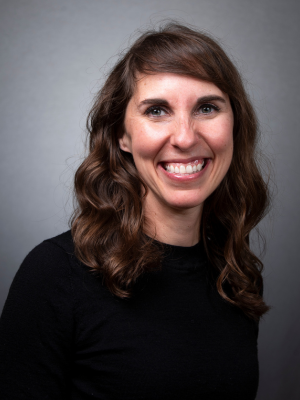FIMS News
Contact Information
FIMS Communications
Becky Blue
Email
519-661-2111x88493
FIMS & Nursing Building
Rm 2060C
Katelyn Esmonde appointed as new HIS Chair
Summer 2024
The Faculty of Information and Media Studies and the Faculty of Health Sciences are excited to announce that Katelyn Esmonde will be joining both faculties as a joint appointment at the rank of assistant professor on July 1, 2024. She will also be the next chair of the Health Information Science (HIS) program.

Professor Esmonde’s academic background fits well into the HIS program and its focus on public health, informatics, digital health and health care-related policy. She completed her PhD in kinesiology at the University of Maryland, focusing on the social significance and ethics of digital fitness tracking.
“I started to look at how individuals, and women in particular, make sense of these big streams of data, such as the Apple Watch, that were starting to become available to them,” Esmonde said.
For Esmonde, it wasn’t just about identifying the possible harms of entities collecting, and consumers having access to, an abundance of data. She wanted to find useful and productive solutions to those problems. This curiosity led her to apply for a postdoctoral fellowship at Johns Hopkins Berman Institute of Bioethics to explore her research through a bioethics lens.
“Critique is important, and recognizing problems is important. With bioethics, you do all that, but you also use frameworks, theories, and principles to think about what to do when you have those problems,” she said.
Esmonde started as a Hecht-Levi postdoctoral fellow at the Berman Institute in 2019 and became an assistant research professor in 2023. Shortly after her initial appointment, the pandemic began, which increased her desire to move beyond identifying problems to finding good solutions for them. Due to the nature of the pandemic, her work shifted to studying public health interventions — such as COVID tracking apps used for digital contact tracing — and the ethics of the government collecting vast amounts of personal health-related information from its citizens. She was also interested in the average person’s response to efforts to collect health data.
“Something that was very interesting to me was that people give up personal data every day to private companies without thinking anything of it. But people were hesitant when the government was explicitly soliciting that information with an eye towards helping people avoid COVID,” she said.
During the pandemic, Esmonde was on a research team that was awarded two U.S.-based research grants, one from the National Science Foundation and a second from The Greenwall Foundation, to support research into how public health information was gathered at the state level and how balancing objectives such as the economy, individual freedoms and public health influenced the way information was shared and received.
“We wanted to know how policymakers knew what they knew about COVID-19, what information sources they were looking at, and how uncertainty about COVID-19 changed over time. We also looked at how these pandemic mitigation policies that affected people’s livelihoods were made with this information.”
Esmonde considers the work she did during the pandemic one of the highlights of her professional work so far.
She is now excited for the next stage in her career as the HIS chair, and the opportunities for growth and collaboration that come with it. The HIS program is a perfect place to bring her broader questions about ethics, the large-scale collection of citizen data, and how people use the information available to them.
“These are things that do fit together, but it can be hard to find a home for all these streams of work. When I saw the posting with the Health Information Science focus, as well as the faculties that I would be a part of, it seemed like a great home,” she said.
Esmonde is especially interested in entering a space where people think differently and are excited to continue learning from others. She looks forward to bringing a bioethics lens to the program along with a unique set of scholarly interests and experiences well-placed to draw on expertise from both the Faculty of Health Science and the Faculty of Information and Media Studies.
“My work has touched on feminist theories, science and technology studies, bioethics, public health, sociology and cultural studies,” she said.
While HIS chair, Esmonde wants to continue to build the reputation of the HIS program so that when students apply for positions, employers will immediately recognize the program name.
“I want the HIS program to be well established and known across Canada and for people to feel excited when someone from HIS is applying for jobs,” she said.
More information about the Health Information Science program can be found at https://www.fims.uwo.ca/his.






